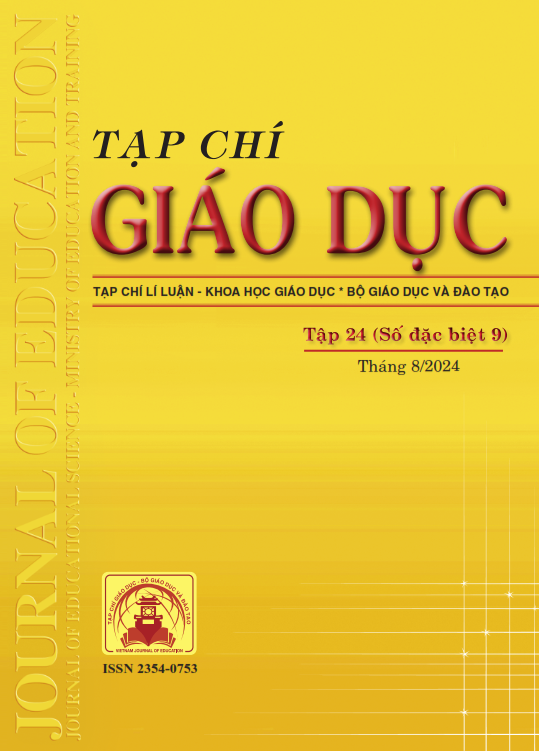Thiết kế bài dạy tích hợp giáo dục phát triển bền vững trong môn Hoá học thông qua mô hình “Lớp học đảo ngược” trên hệ sinh thái giáo dục số
Tóm tắt
Education for Sustainable Development (ESD) is considered a crucial solution to achieve sustainable development goals. In Vietnam, integrating ESD into general education is increasingly prioritized but still faces many challenges. This study proposes a procedure for designing chemistry lessons that integrate ESD using the flipped classroom model in the digital education ecosystem. The lesson “Sugar and Sweeteners” (Carbohydrates topic, Chemistry 12) was developed based on the proposed procedure and tested on 31 students. The results show that students were engaged and their perception of the sustainable development was enhanced. The research findings contribute to promoting the implementation of ESD in high schools in Vietnam. However, further studies with longer durations are needed to investigate more significant impacts, thereby supporting the effective integration of ESD into chemistry lessons.
Tài liệu tham khảo
Abeysekera, L., & Dawson, P. (2015). Motivation and cognitive load in the flipped classroom: definition, rationale and a call for research. Higher Education Research & Development, 34(1), 1-14. https://doi.org/10.1080/ 07294360.2014.934336
Anand, S. A. A. (2021). Flipped pedagogy: Strategies and technologies in chemistry education. Materials Today: Proceedings, 47, 240-246. https://doi.org/10.1016/j.matpr.2021.04.133
Bộ GD-ĐT (2018). Chương trình giáo dục phổ thông môn Hoá học (ban hành kèm theo Thông tư số 32/2018/TT-BGDĐT ngày 26/12/2018 của Bộ trưởng Bộ GD-ĐT)
Brandt, J.-O., Bürgener, L., Redman, A., & Barth, M. (2020). Educating Future Change Agents: Research instruments applied in case studies on Teacher Education for Sustainable Development. http://fox.leuphana.de/portal/files/42048617/EFCA_ResearchInstruments_TeacherEd_FinalVersion.pdf
Buil-Fabregá, M., Martínez Casanovas, M., Ruiz-Munzón, N., & Filho, W. L. (2019). Flipped Classroom as an Active Learning Methodology in Sustainable Development Curricula. Sustainability, 11(17), 4577. https://doi.org/10.3390/su11174577
Burmeister, M., Rauch, F., & Eilks, I. (2012). Education for Sustainable Development (ESD) and chemistry education. Chem. Educ. Res. Pract., 13(2), 59-68. https://doi.org/10.1039/C1RP90060A
Chituc, C.-M. (2021). A Framework for Education 4.0 in Digital Education Ecosystems (pp. 702-709). https://doi.org/10.1007/978-3-030-85969-5_66
Edwards, D. B., Sustarsic, M., Chiba, M., McCormick, M., Goo, M., & Perriton, S. (2020). Achieving and Monitoring Education for Sustainable Development and Global Citizenship: A Systematic Review of the Literature. Sustainability, 12(4), 1383. https://doi.org/10.3390/su12041383
Gardener, H., & Elkind, M. S. V. (2019). Artificial Sweeteners, Real Risks. Stroke, 50(3), 549-551. https://doi.org/10.1161/STROKEAHA.119.024456
Guandalini, I. (2022). Sustainability through digital transformation: A systematic literature review for research guidance. Journal of Business Research, 148, 456-471. https://doi.org/10.1016/j.jbusres.2022.05.003
Gulacar, O., Zowada, C., Burke, S., Nabavizadeh, A., Bernardo, A., & Eilks, I. (2020). Integration of a sustainability-oriented socio-scientific issue into the general chemistry curriculum: Examining the effects on student motivation and self-efficacy. Sustainable Chemistry and Pharmacy, 15, 100232. https://doi.org/10.1016/j.scp.2020.100232
Hancock, T. S., Friedrichsen, P. J., Kinslow, A. T., & Sadler, T. D. (2019). Selecting Socio-scientific Issues for Teaching. Science & Education, 28(6-7), 639-667. https://doi.org/10.1007/s11191-019-00065-x
Howell, R. A. (2021). Engaging students in education for sustainable development: The benefits of active learning, reflective practices and flipped classroom pedagogies. Journal of Cleaner Production, 325, 129318. https://doi.org/10.1016/j.jclepro.2021.129318
Jegstad, K. M., & Sinnes, A. T. (2015). Chemistry Teaching for the Future: A model for secondary chemistry education for sustainable development. International Journal of Science Education, 37(4), 655-683. https://doi.org/10.1080/09500693.2014.1003988
Leicht, A., Heiss, J., & Byun, W. J. (2018). Issues and trends in education for sustainable development. UNESCO. https://doi.org/10.54675/YELO2332
Nguyễn Ngọc Trang, Nguyễn Lan Phương (2024). Hệ sinh thái học tập số vì mục tiêu phát triển bền vững hướng đến đại học 4.0: Cơ hội và thách thức. Tạp chí Giáo dục, 24(số đặc biệt 3), 167-171.
Nguyễn Văn Hồng, Lê Ngọc Công (2012). Con người, môi trường và giáo dục phát triển bền vững. NXB Khoa học và Kĩ thuật.
Nida, S., Marsuki, M. F., & Eilks, I. (2021). Palm-Oil-Based Biodiesel in Indonesia: A Case Study on a Socioscientific Issue That Engages Students to Learn Chemistry and Its Impact on Society. Journal of Chemical Education, 98(8), 2536-2548. https://doi.org/10.1021/acs.jchemed.1c00244
Sadler, T. D., Foulk, J. A., & Friedrichsen, P. J. (2016). Evolution of a Model for Socio-Scientific Issue Teaching and Learning. International Journal of Education in Mathematics, Science and Technology, 5(1), 75. https://doi.org/10.18404/ijemst.55999
Subramaniam, S. R., & Muniandy, B. (2019). The Effect of Flipped Classroom on Students’ Engagement. Technology, Knowledge and Learning, 24(3), 355-372. https://doi.org/10.1007/s10758-017-9343-y
UNESCO (2017). Education for Sustainable Development Goals: Learning Objectives. https://unesdoc.unesco.org/ ark:/48223/pf0000247444
Yacoubian, H. A., & Khishfe, R. (2018). Argumentation, critical thinking, nature of science and socioscientific issues: a dialogue between two researchers. International Journal of Science Education, 40(7), 796-807. https://doi.org/10.1080/09500693.2018.1449986
Tải xuống
Đã Xuất bản
Cách trích dẫn
Số
Chuyên mục
Giấy phép

Tác phẩm này được cấp phép theo Ghi nhận tác giả của Creative Commons Giấy phép quốc tế 4.0 .












